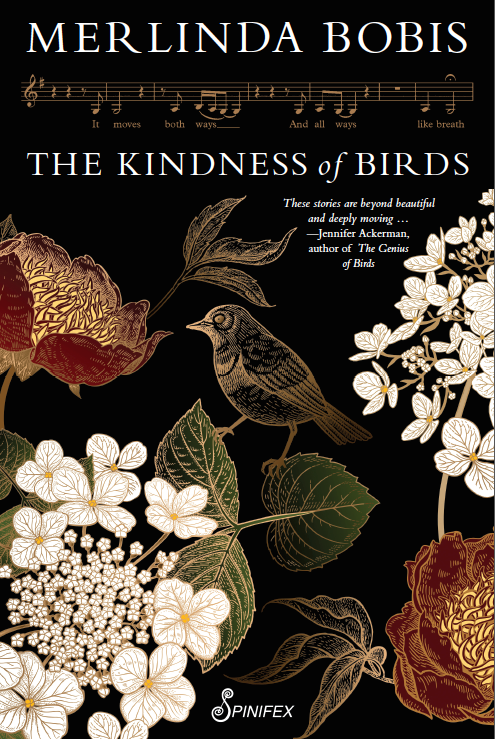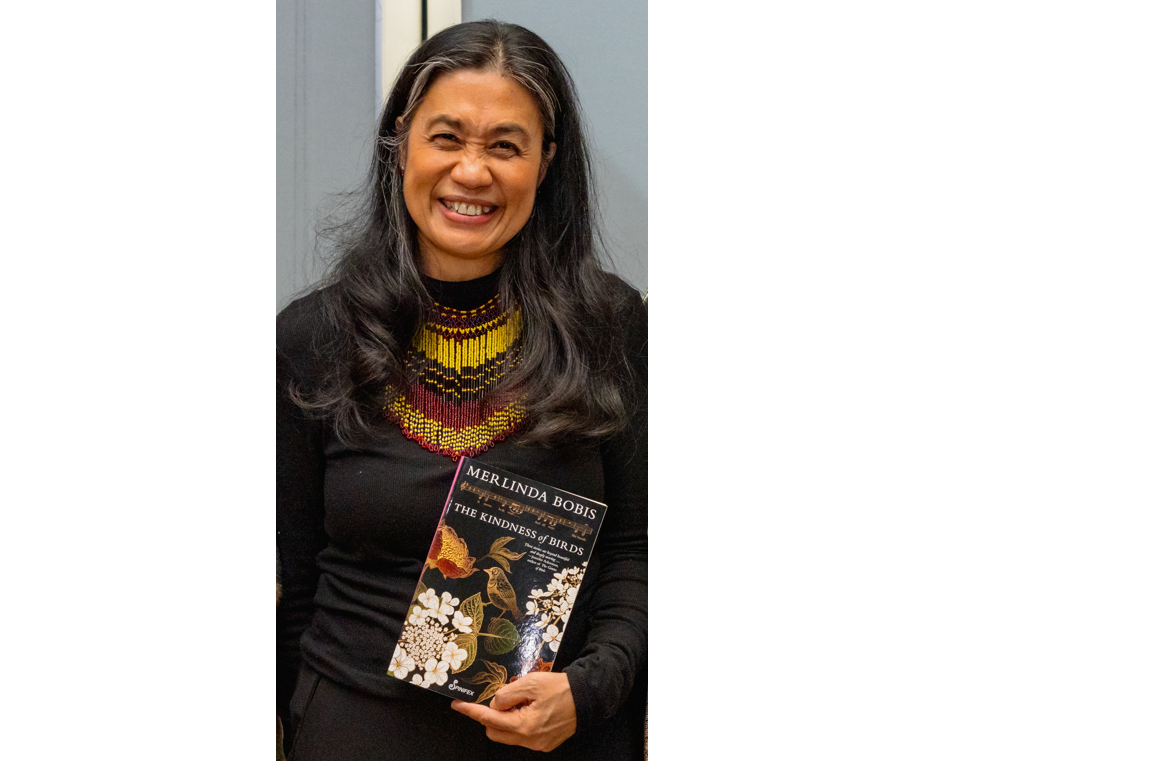
There has been very little to be happy about for some time as the Fil-Aus and the wider community battle COVID-19, an invisible enemy that does not differentiate on people's age, gender, education, religion, appearance, socio-economic, political and other classifiers.
With all the feeling of helplessness around us especially during periods of lockdowns and restrictions put on by the government officials in the attempt to prevent the spread of the virus, we welcome The Kindness of Birds, the new book of Dr Merlinda Bobis, as a good read to uplift us as we follow the 'stay at home' health rule.
The Australian Filipina is glad to share our conversation with Merlinda, a prolific Pinay author, poet, playwright, lecturer and advocate for social justice, women empowerment, the environment and multiculturalism to gain an insight about TKOB and her persona.

*The Kindness of Birds - what is it about and what inspired you to write it?
The Kindness of Birds(Spinifex Press, 2021) is my 12th book. It’s a collection of 14 interconnected short stories that link Australia and the Philippines, and pay homage to kindness across cultures and species in times of devastation: COVID, climate change, war, domestic violence, and death and illness in the family.
How did this book happen? When my father was dying in the Philippines, two Orioles visited and sang for him. When I returned to Australia after burying him in the Philippines, I thought about this one day: those birds comforted my father. And quickly the line “the kindness of birds” came to me — just as two Rosellas flew up the trees outside our balcony in Canberra! They were comforting me too, thus affirming the thought: “the kindness of birds.”There and then, the book concept was born.
*Your focus on kindness in this book is interesting; why kindness?
What is kindness? How do we think and speak of it in our respective cultures? Is kindness “kindness” if it’s only for our kind? These were the questions in my headspace when I was writing the book. And the old knowing of our wise grandmothers in the Philippines responded: remember not only the kinshipbetween humans but also between the human and the non-human world.
So, I wrote their ancient wisdom into stories of resilience and solidarity in multicultural Australia with crossovers to the Philippines. Kinship among women and the planet grew into a major theme, but without excluding the men we love and who love us. After all, as I write in one of the stories in the book, kindness cannot self-isolate. It moves both ways and all ways, like breath.
Also, consider this: when we experience or see racism, discrimination, abuse, we call it. So it can be exposed, corrected, stopped. Now, if we experience and see kindness, shouldn’t we call it too and make it known? We have to name it, tell stories about it. So the storytelling is balanced. This is one of the urgent motivations behind the writing of this book. Yes, we have to expose human frailty and cruelty. But we also need to tell about kindness, especially in these times of devastating crisis brought about by the pandemic and climate change. So much loss, so much grief. We need kindness — and we are capable of it.
*And also why birds? what made you write about them?
As I said earlier, those orioles singing to my father when he was dying inspired the book at the outset. But there is another driver behind my focus on birds. I want the reader to think of kindness not just between humans but also between the human and the non-human world. We have the Filipino social value of kapwa underpinned by care and kindness. We are kapwa or “kin” of each other, so we care for each other. I believe our kapwa is not just our kapwa tao (“person as kin”), but also our kapwa ibon (“bird as kin”), kapwa langgam (“ant as kin”), kapwa tubig (“water as kin”), kapwa puno (“tree as kin”), etc. This kinship (and care) is a necessary fact. Our survival depends on each other. In fact, we are all co-survivors in this shared home, our only home: the planet. So we need to re-orient our mindset. Kindness is not just for our own kind. It is for everyone and everything in this planet.
*In your TKOB launch in Canberra, you shared a part of the book, please share with us an excerpt as well here.
I’m sharing what is so present in our lives now: COVID lockdown. This excerpt from one of the stories is about how a husband and wife (both senior citizens) endure lock down for an extended period of time. Both are afraid of getting sick. Stressful. They start getting into each other’s nerves. So they agree on something:
“They will try to be kinder as they endure this lockdown together. ‘Kindness, dearest, both ways.’ That was the pact they made last night after watching TV’s latest coronavirus update and how the afflicted body succumbs. From what seems like an ordinary cold and cough to flu-like symptoms, then you can’t breathe, you need to be intubated, put on ventilator in ICU, pumped with oxygen, then the organs start shutting down. This was how her father died a year ago, followed last year by her aunt, her sister’s husband, then her mother. All their lungs gave up at the final moment. Can’t breathe, can’t breathe. She felt that way last night, listening to the story of dying, and suddenly all these deaths, faceless figures in an update, became her own.
“How kindred we are in mortality. No, how kind we could be, when breath is still aplenty with much to share around. Because kindness cannot self-isolate, it can’t be locked down for the select kin. Kindness is about making a kin, even of strangers. It movesboth ways and all ways, like breath.”
—“My Love, My Neruse”,The Kindness of Birds, pages 144-145
*Where can people avail of a copy of TKOB
The Kindness of Birds can be ordered from the Spinifex website:
https://www.spinifexpress.com.au/shop/p/9781925950304
In this site, you’ll also know more about the book and listen to recordings of my songs relevant to the book, plus watch the YouTube of the launch at the National Gallery of Australia. You may also get your copy of the book through your favourite bookstore, or any other bookstores including those online.
*What achievements do you hold fondly in your heart?
The best achievement is finishing a story, a poem, a book, finishing the work: getting to the finish line of the writing. And the achievement is not just mine. There is something magical about the writing process. A bird appears, and I hear a word — or a story concept flashes in my head. Sometimes, I dream whole stories and poems. The writer is caught by surprise when something starts happening on the page — where did that come from? Ah, I’ve just been gifted something especial and I have to honour this gift by actualising it on the page. I believe there are other elements or creatures in the universe writing with me. So, the finished story, poem or book is really an achievement shared with all of these ‘others’.
*Lastly, what is your definition of 'success'?
Success is recognising then realising your potential and the potential of the moment. In those moments when I’m given a gift by the universe — a word, an image, a thought, a story concept — when I recognise its value and respond to it to the best of my ability, that is success.
WHO IS MERLINDA BOBIS?
I believe writing is shaped by geography. My creative umbilical cord is linked with Mayon volcano in my first home region, Albay, Bikol. I was born there and grew up at the foot of this active volcano. I can trace my literary sensibility to its passions and capacity to make land fertile. That’s what a storyteller tries to do: fertilise and enrich culture. Bikol is a land of storytellers. And my earliest literary influence in the Philippines was oral storytelling. In Bikol, my grandparents, parents and aunties and uncles were incredible storytellers. I’m the eldest of four children who were always in awe of our elders’ stories.
I finished my Bachelor of Arts from Aquinas University of Legazpi, now University of Santo Tomas Legazpi. I taught English and Literature for 10 years at Colegio de San Juan de Letran, University of Santo Tomas where I did my Master of Arts in Literature, and De La Salle University Manila — and I wrote a lot, mostly poetry then, and thrived among women writer friends and mentors.
I came to Australia in 1991 on a scholarship to do my Doctorate of Creative Arts (in Creative Writing) at University of Wollongong where I taught Creative Writing for 21 years. I’m now retired from teaching, but still affiliated with academia. I’m currently Honorary Senior Lecturer at The Australian National University. And I’m still a writer, because the writer never retires.
Author’s website: merlindabobis.com.au